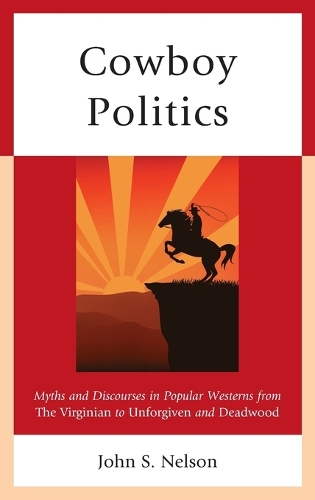
Cowboy Politics: Myths and Discourses in Popular Westerns from The Virginian to Unforgiven and Deadwood
(Hardback)
Publishing Details
Cowboy Politics: Myths and Discourses in Popular Westerns from The Virginian to Unforgiven and Deadwood
By (Author) John S. Nelson
Bloomsbury Publishing PLC
Lexington Books
1st November 2017
United States
Classifications
Professional and Scholarly
Non Fiction
Communication studies
813.087409
Physical Properties
Hardback
412
Width 164mm, Height 235mm, Spine 30mm
699g
Description
The politics of popular westerns are surprising in substance and significance, especially of late. Cowboy Politics shows how westerns in literature, cinema, and television face the challenges of Western Civilization even more than the perils of American frontiers. Its strategy is to compare key westerns with major theories of modern and postmodern politics. So it analyzes novels from Owen Wister to Zane Grey and Larry McMurtry. It focuses on films from the western revival beginning in the 1990s and featuring Clint Eastwoods Unforgiven, while its interest in TV stretches from singing cowboys and Gunsmoke to David Milchs Deadwood. Critics are apt to find in westerns the modern politics of Thomas Hobbes and John Locke. They tap devices of individuality, rationality, contract, sovereign enforcement, and representation to overcome the chaotic violence of a wild zone. Cowboy Politics examines how westerns often find such measures insufficient to tame the West as a culture of honor and anger that deteriorates into feud-al vengeance. Instead westerns see the West as the sunset land that is already growing old and moving on. So westerns seek fresh starts informed by comparing civilizations more than demonizing savages. Westerns worry that modern politics devolve into exploitation, oppression, spectacle, and terror. So they pursue supplements in such postmodern politics as republicanism, perfectionism, populism, feminism, and environmentalism. Especially westerns explore politics of persuasive speech-in-action-in-public, doing beauty, and self-reliance in the modes of Hannah Arendt and Ralph Waldo Emerson. The first two chapters of Cowboy Politics explain how westerns do political theory for popular audiences by making many of our myths: the symbolic stories of individuals and communities which we live daily. The next three chapters trace the initially modern theories of government in many westerns. Then western turns to republican honor, rhetoric, response-ability, and character tracking occupy the following four chapters. And these set the stage for another four chapters on western attention to postmodern terror, mythmaking, celebrity, spectacle, and forgiveness. The final two chapters analyze how late, satirical, and transformative westerns develop realist defenses for their surprisingly postmodern politics.
Reviews
Cowboy Politics is an immensely learned volume that distills a lifetime of study, thinking, reading and viewing into fascinating analyses of novels by Owen Wister, Zane Grey, Louis LAmour and Larry McMurtry, films such as Clint Eastwoods Unforgiven (1992), and also television programs such as Deadwood (2004-6). . . . Cowboy Politics stands as an important piece of cultural and political theorizing. But the main contribution of the work for me is pedagogical. In this study, John Nelson has made an important and convincing case for the inclusion of westerns as worthy lenses onto the history of political theory and the emerging politics of the early twenty first century. * VoegelinView *
Nelson argues that literature, films, and TV shows about the American West reveal deep aspects of The West as a civilization. The result is full of surprising insights into both his fictional material, and the nature and sources of our common culture. -- Charles T. Rubin, Duquesne University
In this encyclopedic study of political myth-making in the genre of Westerns, John Nelson provides a range of tools, questions, and themes for students of political theory to deploy while watching, engaging, and teaching films. Westerns turn out to be an extraordinary font of narratives, rhetorical strategies, and images about American political life when illuminated by Nelsons probing questions and analysis. As with Nelsons earlier forays into various noirs, horror, and science fiction, Cowboy Politics is a stunning intellectual achievement that braids the history of cinema with political history and theory in a lucid style that deepens (without diluting) the fun of watching and discussing the films in question. -- Christopher C. Robinson, Clarkson University
In Cowboy Politics,John Nelson explores how popular Westerns are a key site for grappling with contemporary political dilemmas. With intriguing examples and humor,Cowboy Politicsshows how Westerns point beyond modernity, mixing liberalism with republicanism, and grappling with environmental, feminist, populist and authoritarian challenges. Theorizing in the style of Hannah Arendt, Nelson demonstrates the potential moves that Westerns offer usresponsibility, speech, forgivenessin facing the political questions of our own times. -- Linda Beail, Point Loma Nazarene University
Author Bio
John S. Nelson is professor of political theory and communication at the University of Iowa.
